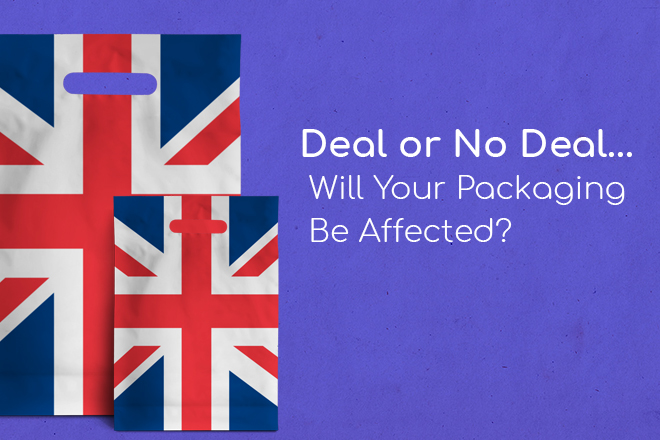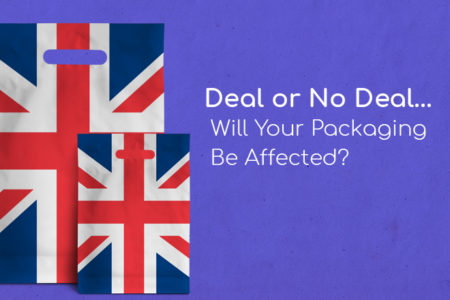
Deal or No Deal? How Brexit may affect your packaging in the future.
At the risk of sounding repetitive, the team at Rocaba Packaging & Carrier Bag Shop, just like the government, have no idea what’s about to happen on 29th March 2019 regarding the final Brexit outcome. We import many of our products from within the EU and so as you’d expect, we have been monitoring the situation in the hope of some clarity for a while.
Unfortunately, nothing has become any clearer. There are, however, a few things that we feel more certain about, and I’m not the bearer of good news, sadly. We’ll see an increase in the cost of a significant amount of packaging products over the next 12 months, which we anticipate will be as much as 20% (and more in some cases). Below is a breakdown of factors that you may want to consider:
Paper vs. Plastic
In the last Budget, the government announced a consultation to extend the Plastic Bag Charge from only large retailers to being applicable to all retailers. From the initial introduction in October 2016, plastic consumption has dramatically decreased whilst paper consumption has gone up – partially in place of this. Will this trend continue? This is going to be hugely dictated by price as paper bags become increasingly expensive. Plastic products are generally imported from outside of the EU zone, commonly the Far East, whereas paper products are mainly from the EU zone. Potential import duties and customs charges will come into force should we end up with a no deal.
Additionally, paper mills are notorious for restricting the supply of raw materials from time to time, and many of the factories report this currently. Prices have gone up 20% in the past 12 months on certain materials, with lead times for paper being as long as 6 months. Manufacturers are currently placing orders with paper mills, not knowing when the paper will be delivered or what price they will have to pay for it. This uncertainty means building in additional margins “just in case”; a tricky situation to be in.
Import Duties
If we do end up with a no deal, moving goods in (and out) of the EU zone will be more difficult. Not only could we see a 2-5% increase in costs for handling, in the future you cannot rule out taxes and duty being added to packaging, which the government are clearly trying to reduce.
Goods requiring customs clearance will inevitable also lead to shipping delays. At present, the ports and borders don’t have to process EU deliveries in the same way that they do for global imports. An inevitable backlog with the thousands of lorries coming into the UK every week will mean that orders will need to be placed with longer lead times, and delivery dates will be much harder to guarantee as goods get held indefinitely for inspection.
Currency Fluctuations
When the referendum took place on 23rd June 2016, the euro was trading 1.3029 (now at 1.1403) and the US dollar was trading at 1.466 (now at 1.2707). A 12.5-13% increase in the cost of goods that is completely unrelated to raw materials, labour or transport and simply based on wider economic confidence is hard to stomach.
Confidence will no doubt take a hit should we end up with a “no deal”, and regarding long-term currency forecasts, some predict that we’ll see 1:1 parity with the euro. Others, however, feel that this uncertainty is already priced into the market. What no-one currently is predicting is a rebound back up to the levels of 3 years ago; we should get used to the current exchange rates.
In summary, if you’re buying plastic carrier bags and packaging right now, the currencies and potential government charges mean that your costs will certainly go up. Current paper shortages and potentially import red tape will only compound the problem for paper packaging users. Many who made the move from plastic to paper for environmental reasons will potentially reconsider and move back to plastic for economic reasons as the cost differentials become larger. Bio-degradable or thicker plastic bags will certainly now start to get more attention, and we’re working on a number of these options.
Other solutions? I guess these depend on whether you like to gamble. For those who can stomach a 10-15% increase in cost for their package and would like to roll the dice, you can wait and see if Theresa May gets a deal over the line (which, let’s be honest, most people are banking on). If you don’t like the uncertainty and would prefer to lock in the cost of your packaging for the foreseeable future, it would make sense to place an order as soon as possible (even if delivery falls after 29th March 2019).
Our team have been fully briefed on the impacts that Brexit may have, so I encourage you to contact us if you’d like any more information or to discuss any potential solutions.
Kind Regards,
Sujan Shah
Chief Executive Officer
Rocaba Packaging Limited


